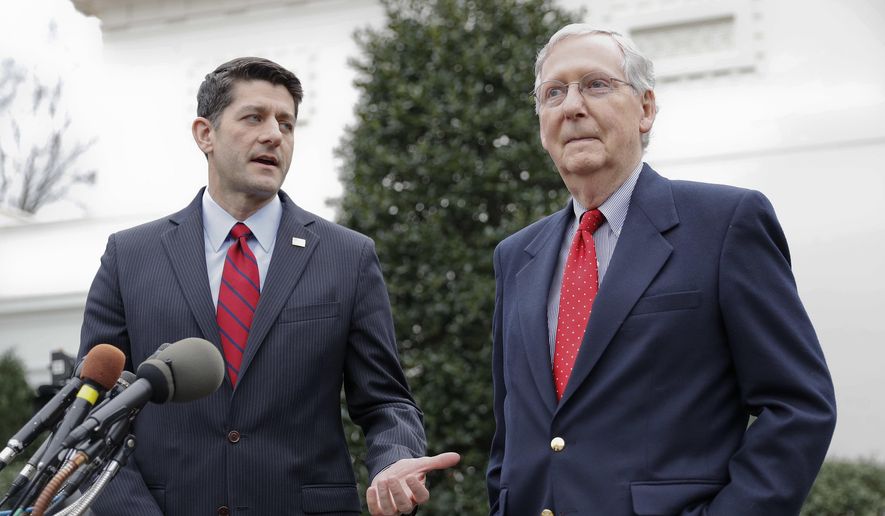OPINION:
Mitch McConnell and Paul Ryan have defied all expectations this year. But not in a positive way.
“Do-nothing” Congresses usually occur in divided government when power in Washington is split between the two political parties and neither party is able to advance its priorities. Senate Majority Leader McConnell and Speaker of the House Ryan have demonstrated over the past ten months that even under optimal circumstances with one party holding the White House and both chambers of Congress, it is still possible to fail to achieve anything meaningful.
Republican voters have every right to be upset.
Obamacare repeal, which has been the focal point of Republican candidates’ campaigns for the past four election cycles, went nowhere this year.
Much-needed immigration reforms that uphold the rule of law? Barely a consideration in the GOP-dominated Congress.
Even something as simple as approving President Trump’s nominees for his administration and for the courts has occurred at a shockingly slow pace in the Senate.
All of that serves as the backdrop for where we are today, with two tax reform bills advancing in the House and the Senate. The GOP needs a win — a big win — at the tail-end of a completely lackluster 2017.
But, to be more precise, the GOP needs the right kind of win, not a simple “check-the-box” win or a perfunctory “we-finally-did-something” win. No, the GOP needs the kind of win that will give Americans the confidence that Republicans should remain in control of Washington after next year’s elections.
If the GOP wants to deliver big on its campaign promises, there are two simple changes Republicans could make to tax reform.
First, make the tax cuts go into effect in 2018. The Senate bill, which the Senate Finance Committee unveiled last week, delays the implementation of the corporate tax rate reduction to 20 percent until 2019.
But why wait until 2019 (after the 2018 elections, it is worth noting), when Americans are ready for economic growth today? Republicans have described the anticipated economic growth that is likely to result from the rate reduction, but the Senate is poised to forego that benefit for an additional year.
The corporate tax rate reduction is the sine qua non of the entire tax reform effort. Delaying the rate reduction adds an unnecessary - and unwanted - year of our current tax code’s excessively high 35 percent corporate tax rate.
The current high corporate tax rate hampers job creation, incentivizes corporations to flee the United States, and slows our economic growth. The Senate should listen to America’s business owners and innovators and reduce the rate in 2018. No delays.
A second way to win with tax reform? Repeal ObamaCare’s much-despised individual mandate. The mandate, which requires all Americans to purchase government-approved health insurance, or else pay a “penalty” (a tax), is one of the least popular aspects of ObamaCare. It is also one of the biggest tax hikes in U.S. history.
Tax reform is not merely an avenue for repealing the mandate - it is the best avenue to do so. After all, the individual mandate was upheld by the Supreme Court only because of Chief Justice John Roberts’ sleight of hand that turned ObamaCare’s “penalty” for non-compliance with the individual mandate into a “tax.”
American citizens, businesses, and many of the states challenged in federal court the constitutionality of the individual mandate and the frightening notion that the federal government could assess punitive fines on people for inactivity. When the challenge reached the Supreme Court, Roberts rescued ObamaCare by declaring that, despite the plain text of the law, Congress had intended for the fee to be a tax. (Never mind the fact that Americans are not wild about the idea of using the federal tax code to coerce people to engage in government-directed activities.)
The individual mandate is in full force today because the Supreme Court declared and deemed it to be a tax. So, what better place to handle the individual mandate repeal than tax reform?
As added inducement for Republican members of Congress, the Congressional Budget Office this month released its estimate that repealing the individual mandate would save the government $338 billion over ten years. It is not often that CBO puts together savings estimates for keeping a major political promise, but that is exactly what we have here.
Americans want reprieve from Obamacare, one of the most expensive part of many families’ budgets. Tax reform could provide that relief.
The GOP-controlled Congress has a rare opportunity to deliver on its most important campaign pledge to the American people to repeal ObamaCare, to provide meaningful tax cuts, and to spur significant economic growth. Done right, tax reform can do all of that and more, if the GOP puts its mind to it.




Please read our comment policy before commenting.